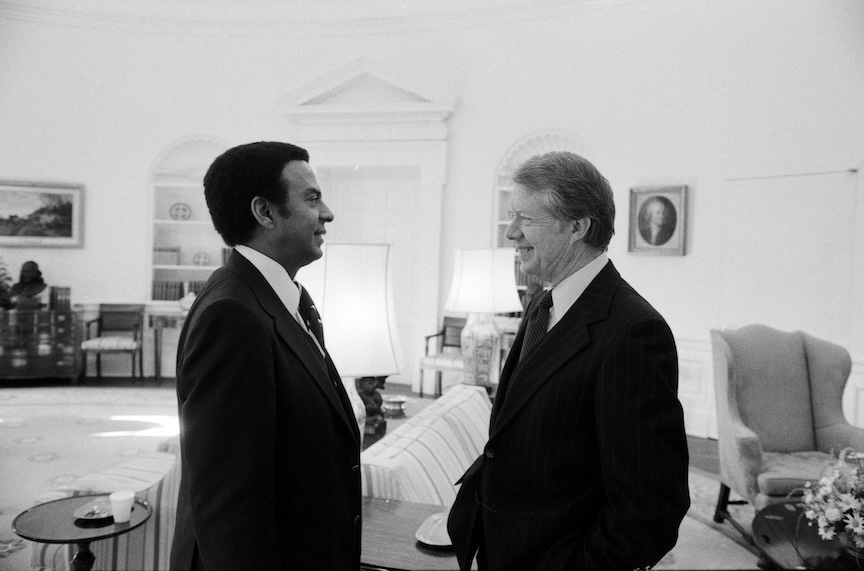1977 Young Ambassador to UN

In 1977, President Carter selected Andrew Young to be the United States Ambassador to the United Nations.
In 1977, President Jimmy Carter appointed Andrew Young as the United States Ambassador to the United Nations, marking a significant moment in American history. Young, a former congressman from Georgia and a close ally of Dr. Martin Luther King Jr. during the Civil Rights Movement, became the first African American to hold this prestigious position. His appointment reflected the Carter administration's commitment to human rights and social justice, both domestically and internationally. Andrew Young's selection as U.N. Ambassador was seen as a bold and symbolic choice. Young was not only a seasoned diplomat but also a strong advocate for civil rights. His background in the Civil Rights Movement, where he played a pivotal role in organizing protests, coordinating voter registration drives, and negotiating with political leaders, provided him with the experience and perspective needed to address global issues related to human rights and equality. Young's appointment sent a clear message that the Carter administration was serious about its human rights agenda. As U.N. Ambassador, Andrew Young quickly made his mark on the international stage. He was a vocal advocate for decolonization and self-determination, particularly in Africa. Young's deep commitment to these issues was evident in his support for the liberation movements in countries like Zimbabwe (then Rhodesia) and Namibia. He was a strong critic of apartheid in South Africa and worked to rally international support against the oppressive regime. Young's efforts helped to increase global pressure on South Africa, contributing to the eventual dismantling of apartheid. One of Young's most notable achievements during his tenure was his role in negotiating a peace settlement in Zimbabwe. He worked tirelessly to bring together the warring factions and played a key role in the Lancaster House Agreement of 1979, which paved the way for the country's independence from British colonial rule. This achievement was a testament to Young's diplomatic skills and his commitment to justice and equality. However, Young's tenure as U.N. Ambassador was not without controversy. In 1978, he met with representatives of the Palestine Liberation Organization (PLO), which at the time was considered a terrorist organization by the U.S. government. The meeting sparked a significant backlash, both domestically and internationally. While Young defended his actions as an effort to engage in dialogue and pursue peace in the Middle East, the controversy ultimately led to his resignation in 1979. Despite the controversy, many viewed Young's willingness to engage with all parties in the conflict as an example of his commitment to peace and diplomacy. After his resignation, Andrew Young returned to public service, later becoming the mayor of Atlanta, Georgia, where he continued to work on issues related to civil rights, economic development, and international relations. His legacy as U.N. Ambassador, however, remains significant. Young brought a new perspective to the role, emphasizing the importance of human rights and social justice in U.S. foreign policy. His efforts to support liberation movements in Africa and his advocacy for dialogue and negotiation in conflict resolution set a new standard for U.S. diplomacy. |
